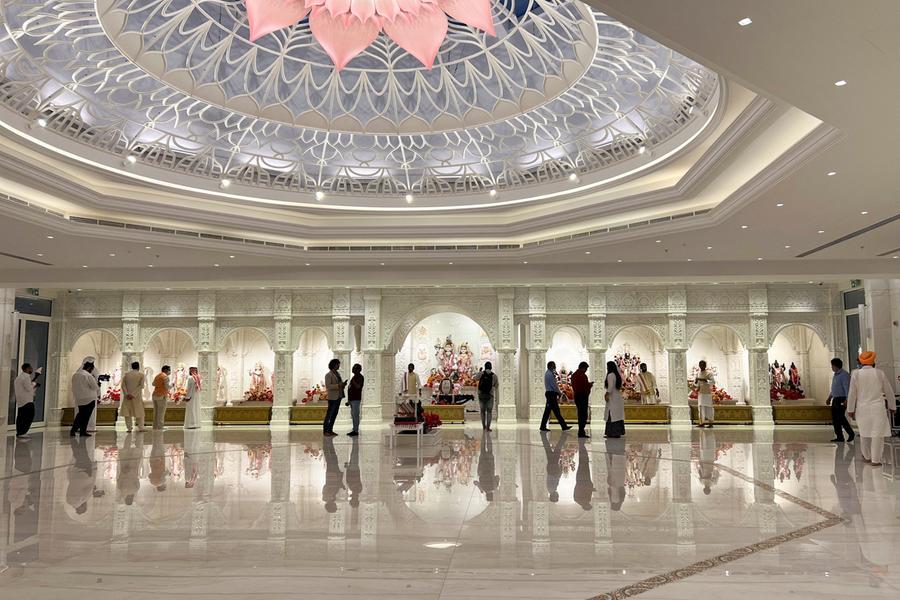In the heart of Bur Dubai, a place of deep significance is etched into the memories of its residents, where daily rituals intertwine with the rich history of the UAE. For Divyesh Kumar Shaholia, the temple complex, a cherished haven dating back to 1958, holds more than just bricks and mortar. It bears the essence of his childhood—when his grandmother, amidst incense and prayers, weaved garlands alongside other women in the sacred precincts of the Bur Dubai Shiv Mandir and Gurudwara.
Since the tender age of seven, Divyesh felt a strong bond with the historic temple, connected to cultural traditions passed down through generations. But now, change is on the horizon. Notices placed that the entrances of the temple complex have reverberated through the community, signalling the imminent relocation of the Shiva temple in Bur Dubai to the Jebel Ali temple by January 3, 2024.
This impending move has stirred emotions and sparked conversations within the community, leaving residents grappling with the prospect of bidding farewell to a sanctuary that has been a constant in their lives. End of an era Reminiscing the old days and speaking to Khaleej Times, some Dubai old-timers like the Shaholias, who came to the UAE 48 years ago, said it’s almost like the end of an era. Divyesh Kumar Shaholia’s father and uncles have been running their gold workshops and stores in the Bur Dubai area since their arrival, and visiting the temple has been a significant aspect of their lives there.
Divyesh said that not a single day went by without him visiting the temple. “I still recall my grandmother sitting and making garlands with other women in the temple. We used to go for the evening darshan (visit) every day after school for several years at a stretch.
Then we would go to our shop in Bur Dubai and distribute the ‘Prasad’ (sweets) to everyone there. This was part of our routine, our life. ” He remembers that during festivals, particularly Janmashtami (birth of Lord Krishna), approximately 10,000 devotees would gather at the old temple.
“The Dubai Police had to handle the crowds as worshippers would fill the area. As more people started using cars, parking became a significant challenge. Initially, we’d drop off the older family members near the temple, and they had to walk quite a distance before reaching the temple grounds.
Meanwhile, we struggled to find a suitable parking spot. ” Divyesh also recalls the time when the family bought incense sticks (agarbatti) in bulk from India. “There was only one shop (in Bur Dubai) selling incense sticks around that time.
Then, over the years, I saw several shops mushrooming in the area selling different types of puja (prayer) items to worshippers. ” Unforgettable temple visit Lakshmi Anand believes that the construction of the new Hindu temple has resolved traffic and crowd issues, given the ample space available in the Jebel Ali area. Lakshmi, who runs a travel and tourism company close to the old temple, said, “Relocation of the iconic Hindu Temple from Bur Dubai to Jebel Ali is saddening.
However, it also gives me joy thinking that the new location is more spacious and will be able to accommodate more worshippers. ” Ever since she landed in Dubai in 2005, Lakshmi has been frequenting the temple, particularly on occasions that were special to her. “I still remember the days when I received my first job offer here and bought my first car.
I had gone to the temple to seek God’s blessings. The location was very close to the place where I lived. I have participated in many rituals conducted at the temple.
” She added, “I live in Al Quasis now. Though the new location in Jebel Ali is far for me, I will continue visiting the temple as always. ” Shops around the old temple Mohan Narasimhamurthy, the General Manager of Hindu Temple Dubai in Jebel Ali, said that the small shops selling flowers and worship items around the old temple area might find accommodation in Festival Plaza in Jebel Ali.
He said, “Dubai’s economy is boosted by over 500-600 shops around the old temple. Many in the textile market start their day with a visit to the temple before heading to work. There’s a strong push from the community to preserve the old temple, and the committee is actively working toward that goal.
We’re exploring all potential avenues to make this happen. ” Narasimhamurthy added, “Simultaneously, we are also checking with the Festival Plaza in Jebel Ali to see if they can accommodate these small shops. We have a challenge accommodating them within the new temple complex since we do not have any extra space.
” He reiterates congestion and traffic issues around the old temple had been a long-standing issue among the public, which nobody could assess back in the 50s when it all started. “Decades ago, when the head of the committee that runs the temple complex, Vasu Shroff, and other community members approached the rulers to give them the place of worship, they were quite kind enough to give this space. But it started growing in numbers, and finally, the number of devotees going there was huge.
During Shivratri (Hindu festival celebrating Lord Shiva), the number of devotees reached more than 100,000. So, due to the congestion, the committee requested for a newer and bigger place. ” Copyright © 2022 Khaleej Times.
All Rights Reserved. Provided by SyndiGate Media Inc. ( Syndigate.
info ). .
From: zawya
URL: https://www.zawya.com/en/life/culture/end-of-an-era-bur-dubai-hindu-temple-relocation-to-jebel-ali-leaves-residents-saddened-xnuzp514



